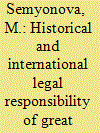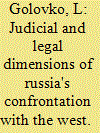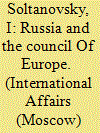|
|
|
Sort Order |
|
|
|
Items / Page
|
|
|
|
|
|
|
| Srl | Item |
| 1 |
ID:
188496


|
|
|
|
|
| Summary/Abstract |
GREAT BRITAIN, once the biggest colonial power, steadily expanded by way of the natural resources of its controlled possessions, the export of their cultural values, and the slave trade. The empire's political and economic vibrancy required strong moral "tenets" that led to the formation of a hypocritical ideology - an alloy of cynical prosperity on the "bones" of enslaved peoples, enlightening messianism, and the heavy "white man's burden" as an alleged source of progress for the rest of the world. Colonialism was and remains, to an extent, a factor of national pride, a combination of imagined racial-ethnic exceptionalism and a condescending attitude toward others. Hence the more or less widely accepted opinion among Britons that the demands, especially of India and Pakistan, that Great Britain repent for the sins of the colonial past are untenable, since under imperial patronage, these countries enjoyed all the boons of civilization, democracy, and free trade.
|
|
|
|
|
|
|
|
|
|
|
|
|
|
|
|
| 2 |
ID:
188464


|
|
|
|
|
| Summary/Abstract |
THE WEST'S judicial and legal activities, including efforts to give the military conflict in Ukraine the semblance of an international criminal procedure - putting Russia as a whole, its military, and top officials on trial, as it were - are inevitable and predictable. In the past, international law in its traditional form (and at some point, since World War II, also in the form of criminal procedure) used to take center stage only after the cessation of hostilities, as the victors' right to define a new international order, but these days, it tends to accompany military actions and sometimes even precede them. This has to do with, among other things, the transformation of classical wars into "hybrid" ones that include not only military but also information, economic, and other components and feature no less fierce and crucial legal battles. It also has to do with the unwillingness of certain Western elites to risk their lives on the actual battlefield, participating instead in armchair battles and seeking to appropriate the morally unchallenged legacy of World War II while demonizing the enemy who will allegedly be put on trial at a new Nuremberg tribunal, etc.
|
|
|
|
|
|
|
|
|
|
|
|
|
|
|
|
| 3 |
ID:
180728


|
|
|
|
|
| Summary/Abstract |
THIS YEAR we are celebrating the quarter-century anniversary of Russia's membership of the Council of Europe (CoE). Twenty-five years is a good time to take stock of the results and make plans based on those results.
I would like to begin with a few words about the organization itself, because, as paradoxical as it may sound, its profile in European politics and in public perception is often very vague. The Council of Europe is often confused with the European Union (EU) or, "at best," equated with the Parliamentary Assembly of the Council of Europe (PACE).
|
|
|
|
|
|
|
|
|
|
|
|
|
|
|
|
|
|
|
|
|